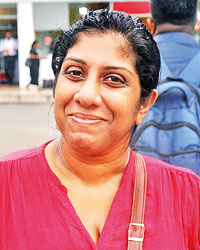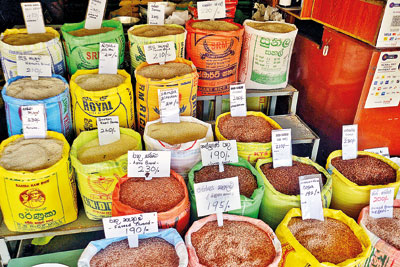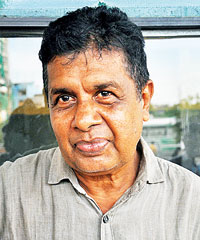News
The budget shatters expectations of relief, raises fears of more taxes
View(s):By Kasun Warakapitiya and Dilushi Wijesinghe
People have expressed mixed reactions to the budget, with some of their expectations of relief on the cost of living shattered as the budget was more focused on strengthening the economy.
People, already battered by the economic crisis, expected the government to reduce prices of essential goods, relax more import limits, and reduce taxes.
With fuel, electricity, and cooking gas prices increasing recently, many reacted angrily as they did not receive any relief.
They fear charges on electricity and water, as well as the price of fuel, will further increase as a result of the Value Added Tax (VAT) increase to 18% from January.

No relief in the price of essentials. Pix by Eshan Fernando and NIlan Maligaspe
They also fear service charges and the price of goods would increase as the VAT includes machinery as well.

Pavithara Senaviratne
The Sunday Times spoke to a cross-section of people who work in the government sector as well as the private sector. Most lamented about the lack of relief but also welcomed measures such as an increase in funding for the Aswesuma welfare benefit scheme and stopping the collection of Rs 3,000 a month rent from low-income families living in houses built under various urban development programmes. Nearly 50,000 families will be given ownership of the houses.
Gonapinuwala Arosha, a resident of Hikkaduwa who works for a privately owned business, said the budget has not given any relief to the middle class and only imposed taxes.
He said that though low-income families and government sector employees were given relief, there was no relief for private sector employees and businessmen.
“I am the father of two daughters; both of them are studying. One daughter is in university. I have to pay for their education. There are class fees, and travel expenses from Hikkaduwa to Colombo are just some of the expenses,” he said.
He added that, apart from that, costs have increased. The profit margin has dropped.
Another private sector employee, A Sachith, who lives in Mathugama, told the Sunday Times that he is concerned that the VAT increase would result in higher fuel, electricity, and water charges and that the service charges as well as the cost of goods, too, would increase.
He also pointed out that the budget had given relief to low-income families, yet the middle-class families who contribute to the economy have been overlooked.
Some state employees said that they are supposed to wait until April to obtain the cost of living allowance. They also expressed fears that the VAT would further increase the cost of living.

State employee Thusitha Kumara said government employees would be given a cost of living allowance of Rs 10,000 from April onwards, but arrears for January to March would be given in instalments.
“The government is going to give us the cost of living allowance by raising funds through taxes, such is the state of the economy, yet we have to accept that because beggars can’t be choosers,” he said.

A Sachith
Another state employee, Gamaralachilage Pradeep Janaka Pushpa Kumara, says the cost of living allowance is a political strategy to give a false sense of economic security to people in the months leading to elections.
A university student, who didn’t want his name mentioned, said that canteen food prices have doubled. He added that he used to visit his parents every weekend back in his village, but now he has cut down on his visits and stays at the university hostel or at a friend’s house as costs are too high. He added that the price of provisions was so high that he finds it difficult to even cook his own meals at his friend’s house.
The student said that he expected relief from the budget, so at least the cost of food items and transport would be reduced. But to no avail.
Pavithara Senaviratne, 38, a kindergarten teacher residing in Panadura, said they had to cut down on extracurricular activities such as concerts as parents find it difficult to spend on costumes, etc.
“We really expected that the budget would give some sort of relief to the people who are already battered by the effects of the economy and the depreciation of the rupee.”
Transport service providers also expressed their frustrations.
All Island Inter District School Children’s Transport Association president N.M. K. Harischandra Padmasiri told the Sunday Times that their expectat ions were shattered as the government had not reduced the price of vehicle spare parts and given relief on fuel prices.
He warned that they were planning to call an islandwide strike.

Gonapinuwala Arosha,
Meanwhile, opposition party members hit out at the increasing poverty levels in the country and the government’s inability to address the issue.
Samagi Jana Balawgaya lawmaker Dr. Harsha de Silva pointed out that the budget has overlooked a staggering increase in poverty, which is affecting three to seven million people. He added that the economic approach lacks a comprehensive plan for making Sri Lanka an advanced economy by 2048.
He said that the cost of living for a family of four had surged from Rs 91,880 in January 2021 to Rs 175,490, a 91% increase in the last two years.
He highlighted the need for a growth rate of 6.4% from 2027 to 2048. He also pointed out the need for measures to combat corruption. He criticised the lack of anti-corruption initiatives.
State Minister of Finance Ranjith Siyambalapitiya claimed that though the VAT will be increased, there will be no impact on the electricity bill and several other sectors.
He explained that the cost of living allowance is not given during the first few months based on the nature of the income pattern.
He said that only 10% of the government’s income comes in from January to March, and from March to June, 40% of the income is gained, while during the term, around 60% of the income is gained and the remaining 40% is obtained during the year-end festive season.
The best way to say that you found the home of your dreams is by finding it on Hitad.lk. We have listings for apartments for sale or rent in Sri Lanka, no matter what locale you're looking for! Whether you live in Colombo, Galle, Kandy, Matara, Jaffna and more - we've got them all!

